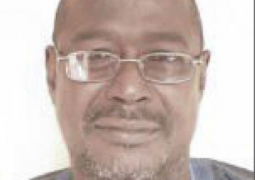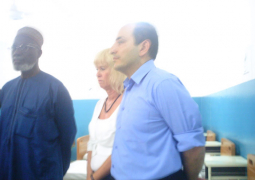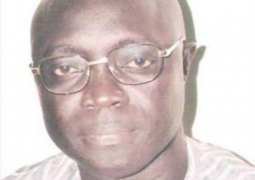
The
case of the Gambia Bar Association against the Judicial Service Commission and
the Attorney General over the appointment of four Nigerian judges has been
referred to the Supreme Court for determination.
The
civil suit was filed by Rachel Mendy, Combeh Gaye and Abdul Aziz Bensouda as
trustees of the Gambia Bar Association at the High Court in Banjul.
At
a recent sitting of the court, the presiding judge, Justice Amina Saho-Ceasay
of the High Court in Banjul referred the case to the highest court of the land
for determination.
She
made the referral while delivering a ruling premised on the preliminary
objection filed by the Judicial Service Commission and the Attorney General.
It
would be recalled that the applicants (the trustees of GBA) filed a suit
against the Judicial Service Commission and the Attorney General, seeking a
declaration that the appointments by the Judicial Service Commission of Edward
E. Ogar, Martias O. Agboola, Simeon A. Abi and Martins U. Okoi as judges of the
High Court was unconstitutional, null and void.
The
bar association is also seeking for an order rescinding the appointments as
judges, claiming that the appointments were not made in accordance with the
1997 constitution.
Lawyer
Yassin Senghore represented the GBA, lawyer Ida Drammeh represented (Judicial
Service Commission) and lawyer D. Binga represented the Attorney General’s
Chambers.
In
her ruling, the presiding judge disclosed that two issues stood out for
resolution considering the preliminary objection filed by the respondents.
She
said the issues are whether the High Court in considering the grant or otherwise
of the reliefs sought by the applicant would have to resort to the
interpretation and/ or enforcement of the constitution, and whether the court
could exercise its supervisory powers over the 1st respondent (JSC).
Justice
A.S. Ceesay said section 133 of the constitution makes provision for the
supervisory jurisdiction of the High Court over all lower courts and
adjudicatory authorities in The Gambia.
She
noted that in the exercise of that authority, the court was empowered to issue
directions, orders or writs including those prerogative orders.
She
revealed that there was no basis for the argument that the High Court could not
exercise supervisory jurisdiction over the JSC.
She
further revealed that the JSC being a body of persons charged with public duty
by virtue of section 147 of the constitution was liable to judicial review.
Justice
Ceesay disclosed that on the jurisdictional challenge, the counsel for the 1st
respondent (Ida Drammeh) argued that section 127(1)(a) of the constitution must
be read together with section 132(1)(b) and that any relief which calls for
international and enforcement of any provision of the constitution other than
sections 18-33 and section 36(5) could not be heard by the High Court and it
could only be determined by the Supreme Court of The Gambia, which in the
language of section 127 of the constitution has exclusive original
jurisdiction.
She
disclosed that the counsel for the applicant (Y. Senghore) argued that the
provisions of section 127(1) (a) was very clear and nowhere in that provision
does it say that each and every time that reference was made to the
constitution, that the case must be referred to the supreme court.
Justice
Amina Saho-Ceesay said the vexed question was the reliefs sought by the
applicant require an interpretation or enforcement of the constitution?
She
said the question was whether the application falls within the province of
section 127(1)(a) of the constitution regarding the exclusivity in the
enforcement of the provisions of the constitution other than the fundamental
rights and freedoms contained in sections 18-33 and section 36(5).
Justice
Ceesay said it was glaring that the GBA trustees application was not seeking
for the enforcement or interpretation of the fundamental rights and freedoms but
the removal of the four High Court judges, an order rescinding their
appointments in that their appointments were not made in accordance with the
1997 constitution.
Justice
Amina Saho- Ceesay disclosed that the reliefs being sought clearly require an interpretation
and enforcement of the constitution and as a result, the reliefs are outside of
the realm of those upon which original jurisdiction in respect of
interpretation and enforcement are conferred upon her court (High Court).
She
declared that the jurisdiction of the High Court to hear and determine the
application was ousted and so vested in the Supreme Court in its exclusive
original jurisdiction.
She,
therefore, granted the preliminary objection filed by the JSC and the AG and
then set in motion the provisions of section 127(2) of the constitution then
referred the matter to the Supreme Court of the Gambia for determination.




